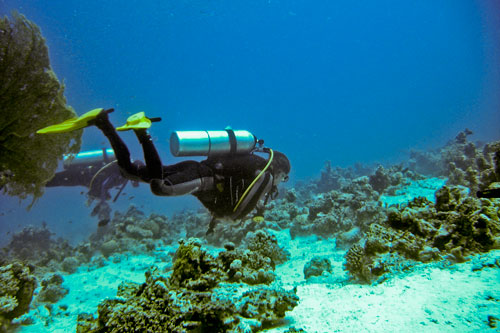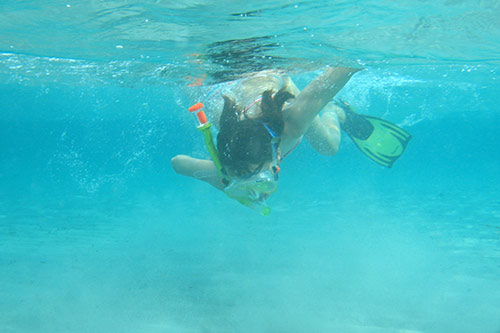Diving and snorkelling

Scuba diver (Photo: M. Kiefl)
Sardinia offers many interesting diving sites. The water is wonderfully clear everywhere and especially the rocky coasts are very rich in species.
The areas around Capo Testa and Capo Caccia are particularly popular. The latter also has numerous underwater caves. Ambitious wreck divers will find numerous shipwrecks and even an aircraft wreck at Capo Comino.
Apart from some restricted military areas and national parks, you do not need a permit to dive. For night dives, only torches may be used as artificial light sources.
Diving schools and bases can be found in almost every tourist town on the coast. Courses and guided dives are offered here. You can rent the appropriate equipment or just get your tanks filled.
You can actually assume that you will be able to communicate in English at every diving centre.
In general, I recommend joining guided tours instead of searching for diving sites on your own.
If you are travelling to Sardinia with the firm intention of diving here for the first time, then you should consider taking an previously course at home.
Such a diving course is quite a strenuous affair. It usually lasts 4-5 days, there is a lot of theory to learn and various underwater exercises to master. At the end there is a written exam. This means that a diving course can take up almost half of your holiday.
If, on the other hand, you already have a diving passport when you start your holiday, you can be much more relaxed about it and concentrate on the underwater world.

Children like snorkelling too
If you only want to watch a few fish or dive for shells near the beach, a mask, snorkel and fins are sufficient.
This way you are much more independent than with a complete diving equipment and not tied to a diving centre.
In the months outside the high season, when the sea water is still relatively cool, a wetsuit is recommended. It not only protects you from the cold, but also from sunburn and sharp rocks.
In high summer, it is best to wear a light-coloured T-shirt for snorkelling to protect yourself from sunburn.
For longer excursions in areas with a lot of boat traffic, an inflatable tow buoy is recommended to warn the boatmen in time.
On the coast, there are shops in almost every town that sell all the equipment you need. Wetsuits and masks are often much cheaper than in other countries.
Finally, one more request: Don’t take an example from the snorkellers who go hunting with their harpoons near the beach. The underwater world around Sardinia has already suffered enough.
Collecting and damaging corals is also strictly forbidden.
